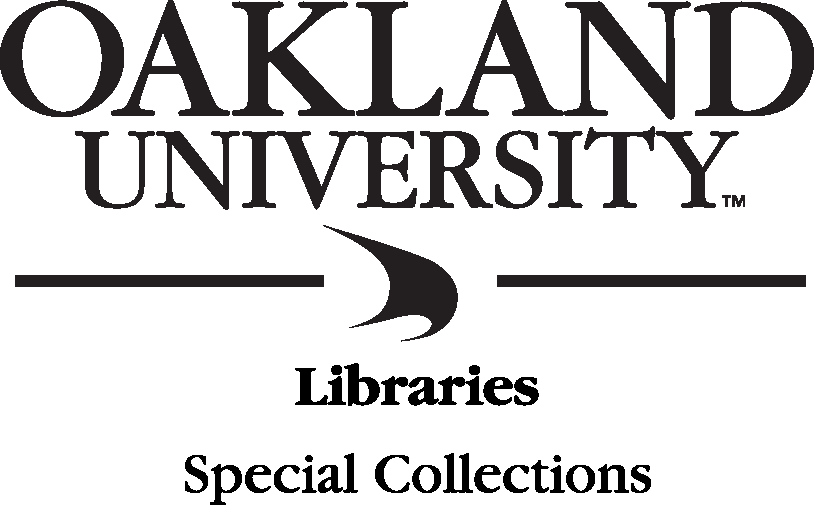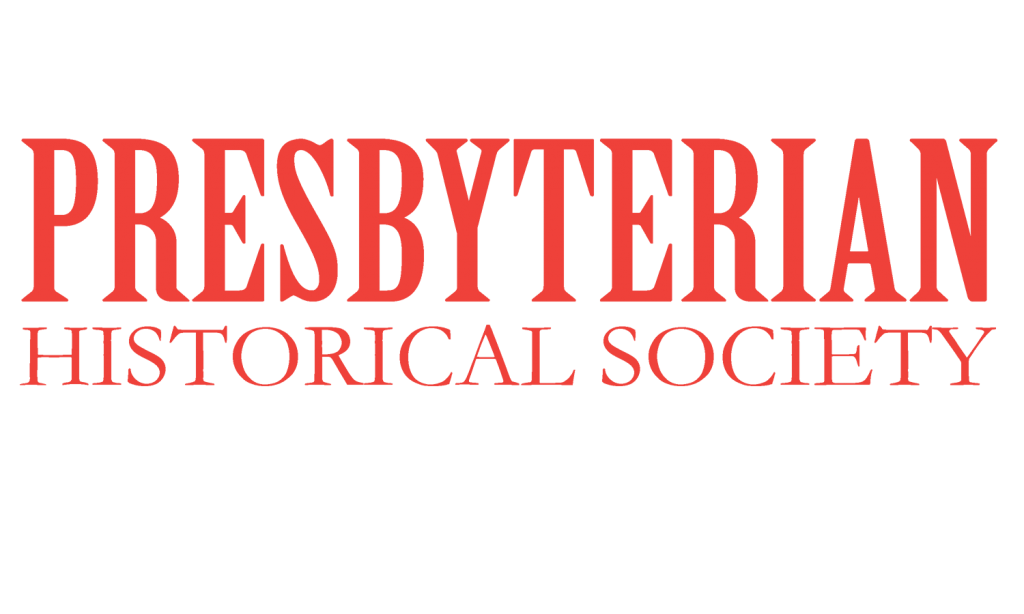from Jun. 1, 1865
A Sermon following upon the Assasination of President Lincoln
-
Full Title
A Sermon Preached in St. John's Church on the Occasion of the National Fast, following upon the Assasination of President Lincoln
-
Description
This sermon, by Rev. C.S. Leffingwell, remembers Lincoln as a religious man equipped with the mental power and wisdom to hold the United States together during a time of war and strife. The sermon further highlights the importance of a unified nation under God, and the divine role of providence in past civil strife. Leffingwell emphasizes the value of honoring the dead who fought patriotically to maintain the unity of the United States.
-
Transcription
STRENGTH IN SORROW.
A SERMON,
Preached in St. John’s Church, Canandaigua,
June 1st, 1865,
ON THE OCCASION OF THE NATIONAL FAST, FOLLOWING UPON THE ASSASSINATION OF PRESIDENT LINCOLN.
----------------------------------------------
BY THE
REV. C.S. LEFFINGWELL, M.A.,
RECTOR
----------------------------------------------
CANANDAIGUA:
Printed at C. Jobson’s office, Bemis Block, 2d story. 1865.
STRENGTH IN SORROW.
A SERMON,
Preached in St. John’s Church, Canandaigua,
June 1st, 1865,
ON THE OCCASION OF THE NATIONAL FAST, FOLLOWING UPON THE ASSASSINATION OF PRESIDENT LINCOLN.
-------------------------------------------------
BY THE
REV. C.S. LEFFINGWELL, M.A.,
RECTOR
--------------------------------------------------
CANANDAIGUA:
Printed at C. Jobson’s office, Bemis Block, 2d story. 1865.
CANANDAIGUA, }
Thursday, 1st June, 1865.}
Rev. C.S. LEFFINGWELL : --
DEAR SIR :
The undersigned respectfully solicit for publication, a copy of the excellent and interesting sermon delivered by you at St. John’s Church, this morning, on the occasion of the Fast day appointed in consequence of the assassination of President Lincoln
Respectfully yours,
JAMES C. SMITH,
EBENEZER HALE,
CHAS. B. MEEK,
SANDERS IRVING,
E. G. LAPHAM,
WILLIAM H. ADAMS,
W. FITCH CHENEY,
A. G. MURRAY.
-------
Hon. JAMES C. SMITH, EBENEZER HALE, Esq., and others :
GENTLEMEN :--
I have to acknowledge the receipt of your complimentary favor of the 1st inst. ; and in acting upon the subject matter of your note, rely upon your judgement rather than on my own, and so, I place at your disposal the Sermon delivered in St. John’s Church, on the memorable day of our National Fast.
Respectfully yours,
C. S. LEFFINGWELL
St. John’s Rectory,}
June 3, 1865 }
SERMON.
“What hath God wrought !” --(NUMBERS. XXIII : 23)
There is a duty laid upon me to-day from which I would almost willingly shrink ; the task of addressing you upon a subject, concerning which, although our thoughts are all in unison, yet a subject upon which a number of my congregation could speak with fuller justice than myself. And for this reason, I had hoped, that one of our own number would address our citizens this evening, from whose wisdom, and large experience with dealing with legal and national topics, we might have gleaned more valuable lessons than it may be in my power to offer.
But, though I feel myself incompetent to the task of the hour, I shall gladly utter the honest conviction of my heart, and in doing this, I feel assured from the oneness of sentiment among us, that my words will meet a response in the breast of all.
A month and a half has passed by, since the murder of President Lincoln, but that brief period will not suffice to enable us fully to estimate the worth of his character, or rightly to judge of the influence which his official work and untimely death will have upon our national future.
Greater men, intellectually, doubtless our land could boost. There were those of a higher culture and refinement among us; there were men of more gracefulness and elegance of manner, and there may have been men of a deeper toned religious life. But he had that degree of religion which taught him to familiarize himself with the Holy Scriptures—to pray to the God of both princes and people,—to infuse into his writings the spirit of our common Christianity, and to make the rare acknowledgement in those public records and official papers, of our utter dependence, as a nation, upon the Supreme Being.
Had others a native exterior grace which he did not share, or an acquired outward refinement which he did not reach? He had the grace of honesty of purpose and singleness of heart, to do his duty well in that state of life whereunto he had been called.
Had others greater charms of manner, and acceptableness of person? He had that degree of attractiveness which has won for him a higher and more enduring place in the national esteem, — than has been gained by any man, since the noble form of Washington was laid down to is quiet rest in the hallowed shades of Mount Vernon.
Could others be found of stronger intellect or more vivid mental brilliance? He had that degree of mental power which enabled him, under God, to accomplish by his steady, persistent efforts, the great hope of a nation's agonising heart, that degree of mental energy which enabled him, as God’s instrument, to bring a brilliant success, the last the greatest experiment of modern history; as experiment whose momentous issues we shall never fully realize; an undertaking whose results only our children and our children’s children will appreciate; an experiment testing the strength , —and, thanks to our God, —proving the stability of our republican form of government.
The winds of division beat fiercely upon it; the waves of rebellion rolled with gigantic force against it, but it stood, —and stands to-day stronger than it stood before, —more firmly established than ever, by earnest hearts and patriotic hands, upon the great rock of eternal right.
Friends abroad withdrew their sympathy, and foes abroad gave aid to foes at home, but we think they would to-day gladly bury the remembrance of their ill-judged deeds, and join with us in rendering honor to the man who, under God, guided our nation through those perilous times; the man who is remembered and mourned all through the land to-day.
Again, it was an experiment which forged upon our government the final solution of the long vexing question, whether it would continue to nurse, to feed, and fattern, with the life blood of the nation, —that offspring of Satan, Human Slavery, or suffer it to die a suicidal death, its hands imbrued in its own blood.
For long and weary years the wisdom of our sagest counsellors had been baffled in every plan and effort, to lift that evil weight from the bowed head and aching shoulders of American civilization. For long and weary years, that curse had been brooding over the land, its ominous threats growing louder, its intimidating menaces growing wilder and fiercer, alarming the timorous and mocking the most confident and brave.
In an evil hour for itself, it gathered up its great resources, and, snatching every adventitious aid, came rushing with demoniac determination to give to the American Union the fel stroke of death.
And in that sad encounter, our quiet, peaceful nation reeled and tottered! Amazed and bewildered, is it strange that she should have reeled? Is it marvellous that she should have stumbled?
But she only stumbled. She did not fall. In her very stumbling she learned her footing. She planted her feet more firmly. She arose with caution, called in the strength hitherto expended upon her accustomed peaceful acts, and renewed the contest with valiant earnestness, while each successive struggle gave to her the valued power of experience.
She gained by continual victories and even by seeming defeat, until now, at last, before her erect, well-knit frame and stalwart form, the foe which sought her ruin lies lifeless at her feet.
The cloud, the veil is removed. The curse of human Slavery is lifted from the brow of American Freedom, while the world abroad looks on with wonder and amazaement, and we at home are filled with earnest gladness. For here, in the very home of Freedom, has Tyranny received her greatest shock! Here in our own land, in our own time and midst, has the greatest experiment of modern history been made. Tyranny has sought the very life of Liberty and has fallen in the act. Human Slavery has reached its possible limits, and has perished in its own eventuatings.
The reaction of this event, the influence of this great stride of Liberty will be felt upon the world at large from this of grace onward.
The rights of humanity have been asserted, defended and upheld. The privileges of the few have been weighed in the balance with the inalienable rights of the many, and, found wanting, have been condemned, and that condemnation has been sealed, —forever sealed, —on this continent, with the blood of the representative man of his age, —him whom we commemorate to-day.
His position as President, during the fearful ordeal of the Rebellion, drew upon him the steady earnest agze of every nation. He stood the foremost man of his time, the embodiment of the great American idea, —“Popular rights, Freedom for all, Oppression to none.” He caught the clarion echo which has rung through our forests, over our vallies and hills, which has resounded in our cities and hamlets, until it has stamped itself upon the American spirit —“Liberty or Death!” Both were reached. Liberty for the enslaved, Death for him. He fell, but his mission was accomplished, his work was done, —and he has now been laid down to his rest, sharing the long sleep of those other heroes, who poured out their life blood on the battle field, martyrs alike to the sacred work of advancing human civilization.
The first words transmitted over the Magnetic Telegraph, whose electric wires now encircle the land were these: “What hath God wrought!”
Man, then only discovered what God had made from the first. It was God’s doing, and in his own time, he permitted the mind of man to observe and apply the subtle element of Electricity to the purposed and wants of civilized life, and now that mystic cord runs in every direction over the world, and its varied uses have become a recognized, essential element, in the work of human progress.
But that first telegram, —“What hath God wrought!” has no more appropriate application to that one advance, than to any other great step of Civilization. The hand of God is to be recognized every where, and at all times.
Does any one ask, if I see the hand of God in the violent scenes which were lately enacted in the city of Washington? I answer, that I recognize the kind, overruling Providence of God in preserving the lives of our national counsellors in their great extremity, and looking further back, I acknowledge the providence of God’s overruling care, in continuing him, their chief, in life, and effective health, and strength, so long as he did, —in preserving him through all those imminent perils, until his work was done.
His life, to all human appearance, was in far greater danger many times before. He had incurred risks which called forth the fears of the nation.
The memorable night of his inhuman slaughter, was marked by no sign of evil. No danger appeared in view. The great jeopardies, the apparent hazards had all been ventured before, and in and through them a good providence had sheltered him; —and now, when the work assigned him to be accomplished in active life had been done, —the work assigned him to be accomplished in death was permitted to occur.
In that event, God has taught afresh, and with an emphasis never more thrilling, that any human arm, to which nations or individuals may cling for defence or safety, is frail as the bending reed, and fleeting as the passing hour.
That human aid, though given by God’s goodness, and sustained by God’s providence, is only human and is to be given up in God’s own time. That lesson we have been taught anew, which the Psalmist inculcated long centuries ago: “It is better to trust in the Lord that to put any confidence in princes.” Their power is feeble and limited. They are weak and finite. They must perish like ourselves, —for they are subject to the same unhesitating call. The highest form must bend. The strongest arm must yield. The wisest and most prudent, cannot foresee, and prevent, the inevitable lot of all. Death renders no homage to lofty place, or deference to highest worth. All earthly powers are tributary to the King of Terrors. He walks the palace floor,and climbs the very throne. He snatched the sceptre from the hand of power, and tramples on goodness,and mocks at greatness.
The worthiest princes, as was said of David must, after serving their generation for a time, fall asleep. For this reason we are to moderate our confidence in them, and make it subordinate to the trust we should ever repose in God. Theirs, may indeed, be wise designs, and generous purposes for the nation’s good, but when “their breath goeth forth, then all their thoughts perish!
What vain props are these, for nation’s security! What uncertain support, what unsafe reliance, is any thing short of God, upon whose direct guidance we all are freshly taught to lean.
In coming years, men will read the record of our late civil strife, with a truer understanding of God’s Providential guidings, and will be able to trace the steps of his wisdom and goodness and love, in many of the complicated and trying events of the time, which we from our nearer position, may be unable to decipher.
But even now, blind is the eye, and unbelieving the heart, which does not recognize the Providence of the Lord of Hosts, in leading this great people, through broad fields of blood toward the quiet valley of rest, guiding our perilous march, made with agonizing hearts, through the black night of war, and bidding us to celebrate the dawn of peace., while gathered as one great mourning nation, even around the new-made grave of our slaughtered leader.
That death occurred with the fore-knowledge, and permission of the omniscient God, and, as concerning our great gladness in victory and peace, so concerning our great grief in the loss of the President, —we may well exclaim with wondering awe: “What hath God wrought!” How he allied grief unto gladness! How he dashed our growing joy with sudden and weighty sorrow, —and made that unforeseen, abrupt commingling of smiles and tears, a nation’s emblem of human life! How he evidenced to all, that which every christian man should remember in his private individual life, that the hour of victory is the hour of danger!
And even in minor and more personal matters, the providence of God has been plainly apparent. How brief the victim’s suffering! How promptly the foul assassin was brought to bay, and how wisely was his evil disposed of! How quietly our government passed on, in its regular functions! How quickly was the great Rebellion ended! How rapid the events of those few days! Who can forget them!
There is such majesty, such a power in solemn universal grief, that in those dark hours of sorrow we felt within ourselves and in each other, a firm strength and a oneness, which gave to the American nation a presence and a mien approaching the sublime! In solemn quietness we stood, and looked calmly upward to our God, though vivid hopes and startling fears were pulsating in every vein! But God’s arm brought salvation. His providential care, bridged over the danger. And now, as we see those fears removed, and those hopes reaching fruition, is it too soon, in view of all that has been done, —in view of all that has been gained, and of all that has been lost, is it too soon to exclaim with reverence, —“What hath God wrought!”
Brethren, who of us hereafter will reckon upon any certain morrow? A few weeks since, —in that holy season, when we were reviewing the sad scenes of Calvary, —on the last morning of the week, when as it were we watched the holy sepulchre where our Lord was laid—there came sudden tidings! In whispered tones men told them to each other. “Impossible!” we each one cried, —but it was true.
Our President was dead! —dead, while almost countless armies, awaiting his bidding, —dead, while the great world was watching for his next movement.
Who then of us will count with certainty upon any to-morrow!
But while we do live, let us, as we now, led by the hand of God are merging upon better and brighter times, —let us cherish the memory of the patriotic dead, —the heroes who have gone forth in our stead—who have fought our battles for us, and have perished.
Let them still live, Let their names be always fresh, and their memory ever green, that in generations to come our children may cherish their worth, and honor their deeds, —as we have done honor to the heroes of revolutionary fame.
Wherever they lie buried, in prison vault or open field—there is a shrine for patriotic pilgrimage, —“there is a spot, at which, for ages to come, valor shall gain fresh life,and where freedom shall trim her torch.”
They have not died in vain, —their death procures for us a lasting peace, enlarges the area of human freedom, builds up in every corner of our land, a tower of strength impregnable to any foe abroad, and points forever to the bloody doom of treachery at home!
Shall we not then, as Christian Patriots, give unto God the glory due for his providential care, and in view of all that we have gained, as well as in view of all that we have lost, exclaim with reverence, —
“WHAT HATH GOD WROUGHT!”
THE PRAYER FOR UNITY
______
Almighty God, we implore Thy mercy for all the people of this land, and more especially therein for all Christians; beseeching Thee to give us grace, seriously to lay to heart, the great dangers we are in, by our unhappy divisions. Take away all hatred and prejudice, and whatever else may hinder us from godly union and concord; that, as there is but one body and one Spirit, and one hope of our calling, on Lord, one Faith, one Baptism, one God and Father of us all; so may we henceforth be all of one heart and one soul, united in one holy bond of truth, of faith and charity, and may with one mind and one month glorify Thee; through Jesus Christ our Lord. Amen.
[Transcription by: Hannah A.B. and Dr. Susan Corbesero, Dr. Susan Corbesero’s Class, Ellis School, Pittsburgh, Pennsylvania] -
Source
Ms 100912
-
Rights
Use of this item for research, teaching and private study is permitted with proper citation and attribution to the Connecticut Historical Society. Reproduction of this item for publication, broadcast or commercial use requires permission. For permission, please contact the Connecticut Historical Society. chs.org/research/digital-reproductions/
-
Tags
-
Cite this Item
Rev. C.S. Leffingwell, M.A., Rector. "A Sermon Preached in St. John's Church on the Occasion of the National Fast, following upon the Assasination of President Lincoln". C. Jobson's Office (Canadaigua:Bemis Block, 2d story, 1865). Remembering Lincoln. Web. Accessed May 11, 2025. https://rememberinglincoln.fords.org/node/864
from Jun. 1, 1865
A Sermon Preached in St. John's Church on the Occasion of the National Fast, following upon the Assasination of President Lincoln
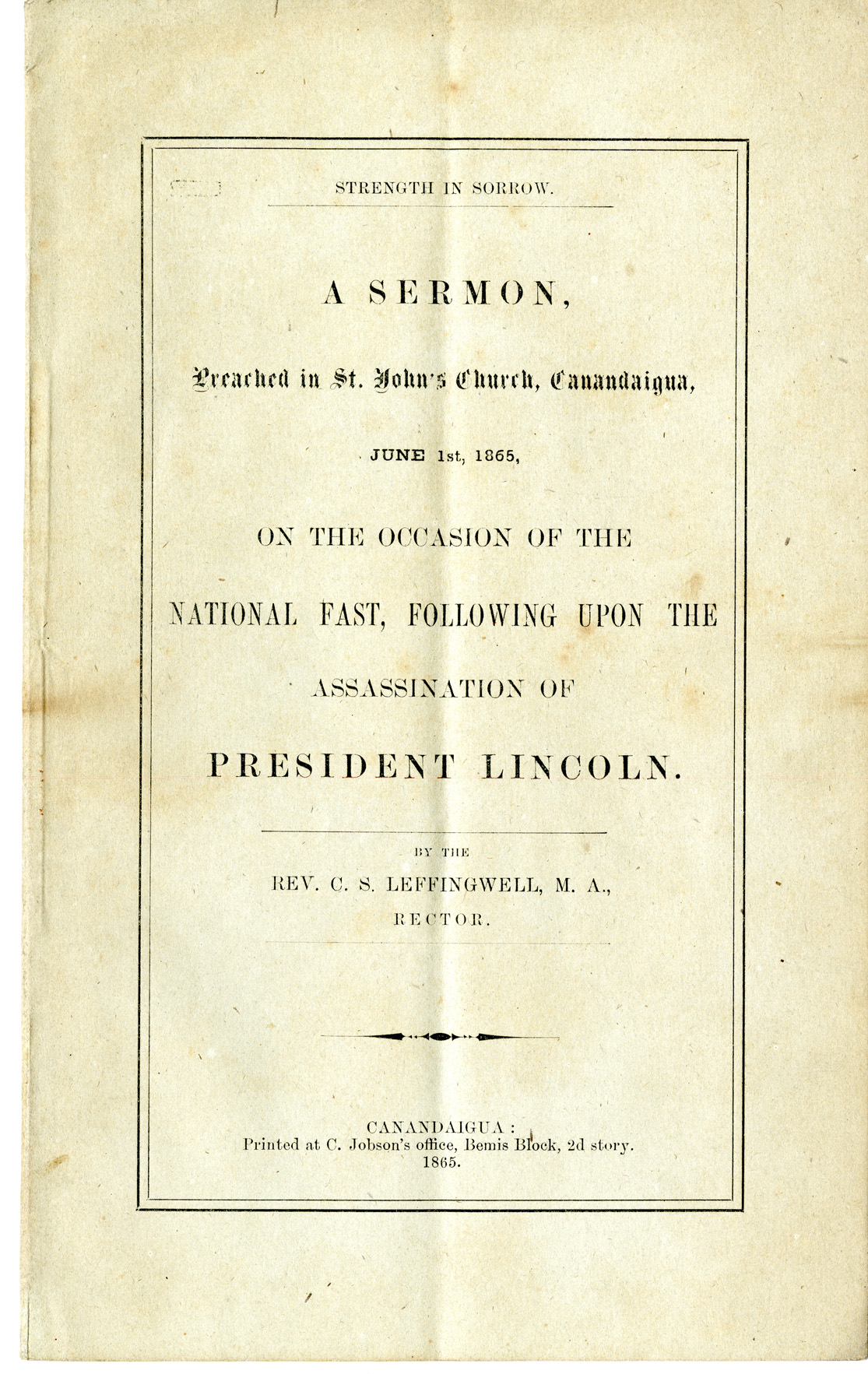
-
Description
This sermon, by Rev. C.S. Leffingwell, remembers Lincoln as a religious man equipped with the mental power and wisdom to hold the United States together during a time of war and strife. The sermon further highlights the importance of a unified nation under God, and the divine role of providence in past civil strife. Leffingwell emphasizes the value of honoring the dead who fought patriotically to maintain the unity of the United States.
-
Source
Ms 100912
-
Rights
Use of this item for research, teaching and private study is permitted with proper citation and attribution to the Connecticut Historical Society. Reproduction of this item for publication, broadcast or commercial use requires permission. For permission, please contact the Connecticut Historical Society. chs.org/research/digital-reproductions/
-
Creator
Rev. C.S. Leffingwell, M.A., Rector
-
Publisher
C. Jobson's Office (Canadaigua:Bemis Block, 2d story, 1865)
-
Date
June 1, 1865
-
Material
type on paper
-
Dimensions
22.5cm x 14cm
from Apr. 23, 1865
Letter to Jane Betts from Harriet Farley, April 23, 1865
-
Full Title
Handwritten letter to Jane Betts from Harriet Farley, April 23, 1865
-
Description
Handwritten letter to Jane (Young) Metcalf Betts from her aunt, Harriet Farley, in Burr Oak (St. Joseph County, Mich.), April 23, 1865. On the bottom of page one and top of page two, Harriet writes about the shocking news of Abraham Lincoln's death. She describes him as a "A father to his country, a tried friend of humanity". On Sunday, the local community marched from the Methodist church to the depot and had a public gathering with all three ministers present who spoke solemnly. She notes all town flags were draped in black. On Wednesday Elder Lamb gave a discourse at the Baptist house and Mrs. Wiltsie spoke at the schoolhouse. It is unclear if these last two speakers spoke of Lincoln or religious matters. This is a long (4 page) dense, chatty letter about marriages, deaths, family and local news unrelated to Lincoln. Jane (Young) Metcalf Betts and her husband 1) Taber Metcalf, later 2) William Betts, and her son, Irving Metcalf, lived in Burr Oak and Saint Joseph County, Michigan, as did her Aunt Harriet Farley. Irving served in Company D, 11th Michigan Infantry during the Civil War.
-
Transcription
[Page One]
Burr Oak [Mich.] Aprl 23, 1865
Sabbath afternoon
This is a cold, windy day
alone by the fire side [crossed out] I have been to church, was at home
by the fire side, thinking it a favorable time to[inserted] write somewhat
to Jane & Wm & Evy [Jane, William Betts and Irving Metcalf], I Fancy to myself how you look
there in your strange home. Have all the surroundings pictured
out in my mind. I received your letter of the 20th and one
from Phebe last week. She had not received yours at that time
the 13th. I presume she has written before this time and given you
the details of the singular disease which caused the death of
your Uncle Cotton, a Carbuncle we know must be very distress-
ing, but seldom proves fatal to life, Aunt Elesta writes
that he was prostrate almost form the first attack. They had a
serious time taking care of him 3 weeks. She says he was patient
through it all. They were feeling anxious about Frank, had not
heard from him since the last battle. I begin to think more about
going to see my folks, but life and all earthly things are so
uncertain we can know but little beyond the present.
Now I would say something about the shocking event which has
brought sorrow and mourning to so many hearts, but words seem
to weak and insignificant to express our individual feelings
and when we think of a nation bereaved of such a friend
as Abraham Lincoln! A father to his country, a tried
friend of humanity, we may only commune with our own
hearts and be still. Yet there have been efforts made here
as in other places to manifest the sincere love & great respect
that is justly due to so noble a man as our late President.
Last Sabbath an appointment was given out from the people to
[Page Two]
to meet at 3 o’clock at the Methodist church, from there
they marched down to the depot grounds where some preparations
had been made, the three ministers were present and each made
a speech appropriate to the occasion, It was truly a solemn time.
The old flag appeared impressive, draped in black on [inserted] almost every
house was the emblem of mourning, - On Wednesday the Baptist
house was crowded tho’ the rain prevented many from
attending. Elder Lamb gave a discourse as well as he was
capable of doing. In the evening Mrs. Wiltsie spoke at the
schoolhouse on the same subject. She had lectured here
the Friday before, and could not then say when she would
come again. On Monday afternoon I received a letter from her
stating that she would be here Wednesday evening, the time
was short to get notice circulated, no school, so there seemed
to be no chance to publish the appointment. A donation for
Elder Douste was to come off that afternoon and evening.
Under such circumstances we could not expect much-
However, to our surprise, the house was crowded, more than
could be seated, a very respectable and attentive audience.
Even Mr. & Mrs. Phelps, some of the WIllises and many other
Church members were there. I believe all were astonished.
The discourse was splendid. Some said she had her subject
well studied. She solicited bid for the poor soldiers, took
over twelve dollars, and nine dollars on Friday evening before.
Now it occurs to my mind I must tell you of another death.
Isaac Toll’s wife. The gay and musical woman has passed
from earth to the spirit world.
[Page Three]
It is getting late in the evening. I shall not be
able to finish my letter tonight. My eyes are quite weak.
They were very sore when my cold was so bad, my health
is pretty good again, my ear has come to its hearing again.
Carrie has been over to see me since I commenced writing she
is very kind and attentive since you left. So is Mrs. Cross
and all the folks. I shall not seem any time to be lonesome.
Monday morning [sidewise in the margin]
Mrs. Ward has bought a cow. I have all the milk that I need, and
Saturday Carrie churned, got a fine roll of butter. They intend to
sell the milk in future. Last week was a busy time with me
had visitors withal, Old Mrs. Vance from Branson staid [sic] with
me 3 nights, had the Gates one day, came in the morning, and
Mrs. Perry part of two days, staid [sic] over night, but not with me. I find
it rather difficult to get up a meal of vituals [sic] in order in my little
cluttered room, but make out to get along somehow, went over to
Ward’s to bake bread and pies. Thursday I got time to see some on
my dress, for the first since you left. Friday did a large wash-
ing (for me). Saturday finished the dress. It looks nicely, so the
ladies say, and I think so too. – Now withal[sic] the excitement and
doings that transpired last week Sarah Jane was married to
Dorsey. The wedding came off Thursday morning, and they
started on the cars, for a wedding tour, like other folks.-
Minta & the Col. Made quite a spread. They invited Mr. & Mrs.
Schmidt Mr. & Mrs. Parker and their daughter Mrs. Sutton,
Mr. & Mrs. McDonald, Elder Douste and lady of course, Ell Crane
and his lady were appointed to wait on the bridal pair, stood up
with them & etc. Kena was invited. She says everything was very
nice indeed. But there seems to prevail a general feeling of p8ity for the
Thoughtless girl.
[Page Four]
I don’t think of much more to write just now.
I read your letter to Father & Mother Betts. They seemed
to feel some better about you. I was not surprised
that you had rather a bad time of it at first, expected it
would be so. We were glad to hear that Evy’s eyes are well.
When I heard they were sore thought probably it would
result to the benefit of his general health as I think mine
did, tho’ I pitied him and you too. I heard from you
so often the time did not seem long since you wrote
to me, write when you can conveniently. Father Betts
talks of sending a bottle of ink, because you write with a
pencil every time. Charles was at home yet tho’ I heard
the children don’t mind this cough much, I believe it is
not the regular whooping cough. Now I think of a little
more to tell you tho’ not very interesting. George McMellin
was married [sic] week ago last Sunday to Mrs. Livermore’s daughter
Also Mrs. James ‘ daughter to Jake Whitman. Thus we hear of
deaths and mariages[a-inserted, sic]. Yet the world moves on in its course.
We think that Kena has got into the element that
suits her pretty well at last. She appears quite like a woman.
Has plenty of work, employs 3 women besides herself C and C.
Mary Ann Weaver got hurt badly by falling, was not able to do
anything the last I heard from her. It is now about 10 0’clock.
Have not had my breakfast yet. You will think it is time
for me to stop writing I hope. Wm. Will try to be more care-
ful of his health, and not work himself all up, be more patient.
I want to say to Everett He better get a few
more hens, if he can. I want to hear something
about Mrs. Leathrop next time you write. Harriet Farley
-
Source
Clarke Historical Library, Central Michigan University, Doris L. King Family Papers, 1822-1877
-
Rights
This item may be reproduced and used for any purpose, including research, teaching, private study, publication, broadcast or commercial use, with proper citation and attribution.
-
Tags
-
Cite this Item
Harriet Farley. "Handwritten letter to Jane Betts from Harriet Farley, April 23, 1865". Remembering Lincoln. Web. Accessed May 11, 2025. https://rememberinglincoln.fords.org/node/850
-
Creator
Harriet Farley
-
Date
1865
-
Material
Letter
-
Dimensions
10x15.5 inches
from Apr. 23, 1865
Handwritten letter to Jane Betts from Harriet Farley, April 23, 1865
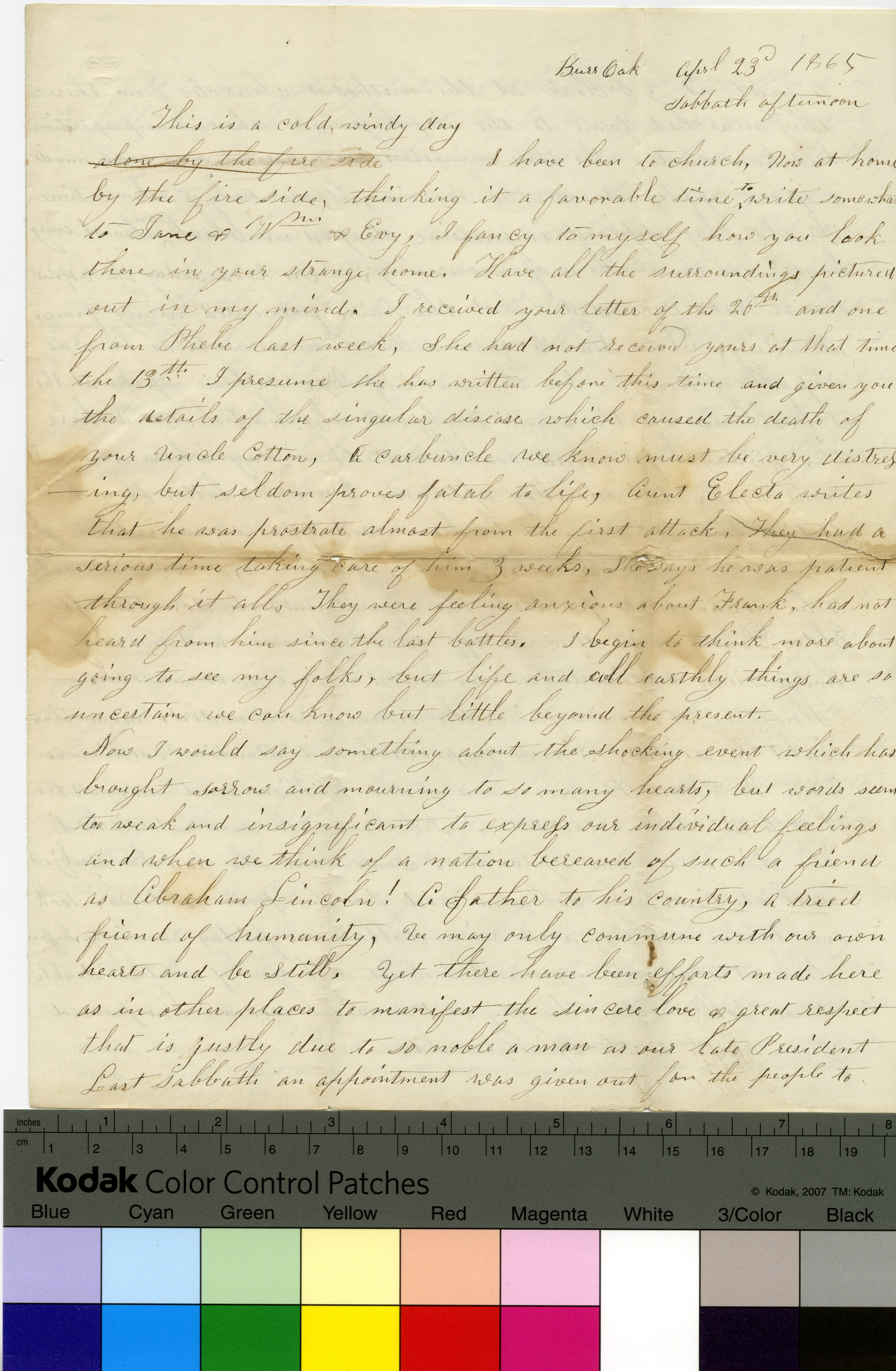
-
Description
Handwritten letter to Jane (Young) Metcalf Betts from her aunt, Harriet Farley, in Burr Oak (St. Joseph County, Mich.), April 23, 1865. On the bottom of page one and top of page two, Harriet writes about the shocking news of Abraham Lincoln's death. She describes him as a "A father to his country, a tried friend of humanity". On Sunday, the local community marched from the Methodist church to the depot and had a public gathering with all three ministers present who spoke solemnly. She notes all town flags were draped in black. On Wednesday Elder Lamb gave a discourse at the Baptist house and Mrs. Wiltsie spoke at the schoolhouse. It is unclear if these last two speakers spoke of Lincoln or religious matters. This is a long (4 page) dense, chatty letter about marriages, deaths, family and local news unrelated to Lincoln. Jane (Young) Metcalf Betts and her husband 1) Taber Metcalf, later 2) William Betts, and her son, Irving Metcalf, lived in Burr Oak and Saint Joseph County, Michigan, as did her Aunt Harriet Farley. Irving served in Company D, 11th Michigan Infantry during the Civil War.
-
Source
Clarke Historical Library, Central Michigan University, Doris L. King Family Papers, 1822-1877
-
Rights
This item may be reproduced and used for any purpose, including research, teaching, private study, publication, broadcast or commercial use, with proper citation and attribution.
-
Creator
Harriet Farley
-
Date
April 23, 1865
-
Material
Letter
-
Dimensions
10x15.5 inches
from Apr. 17, 1865
Lesson of the hour
-
Full Title
The Lesson of the hour. Justice as well as mercy.
-
Description
A discourse preached on the sabbath following the assassination of the President, in the Capitol Hill Presbyterian Church, Washington, D.C., by the Pastor, Rev. John Chester. 300 copies of this eulogy were distributed. The author intended it as an appeal to the consciences of all supporters of the Union.
-
Source
Springer Collection, Oakland University Special Collections
-
Rights
This item may be reproduced and used for any purpose, including research, teaching, private study, publication, broadcast, or commercial use, with proper citation and attribution.
-
Tags
-
Cite this Item
John Chester. "The Lesson of the hour. Justice as well as mercy.". Washington Chronicle Print . Remembering Lincoln. Web. Accessed May 11, 2025. https://rememberinglincoln.fords.org/node/815
from Apr. 17, 1865
The Lesson of the hour. Justice as well as mercy.
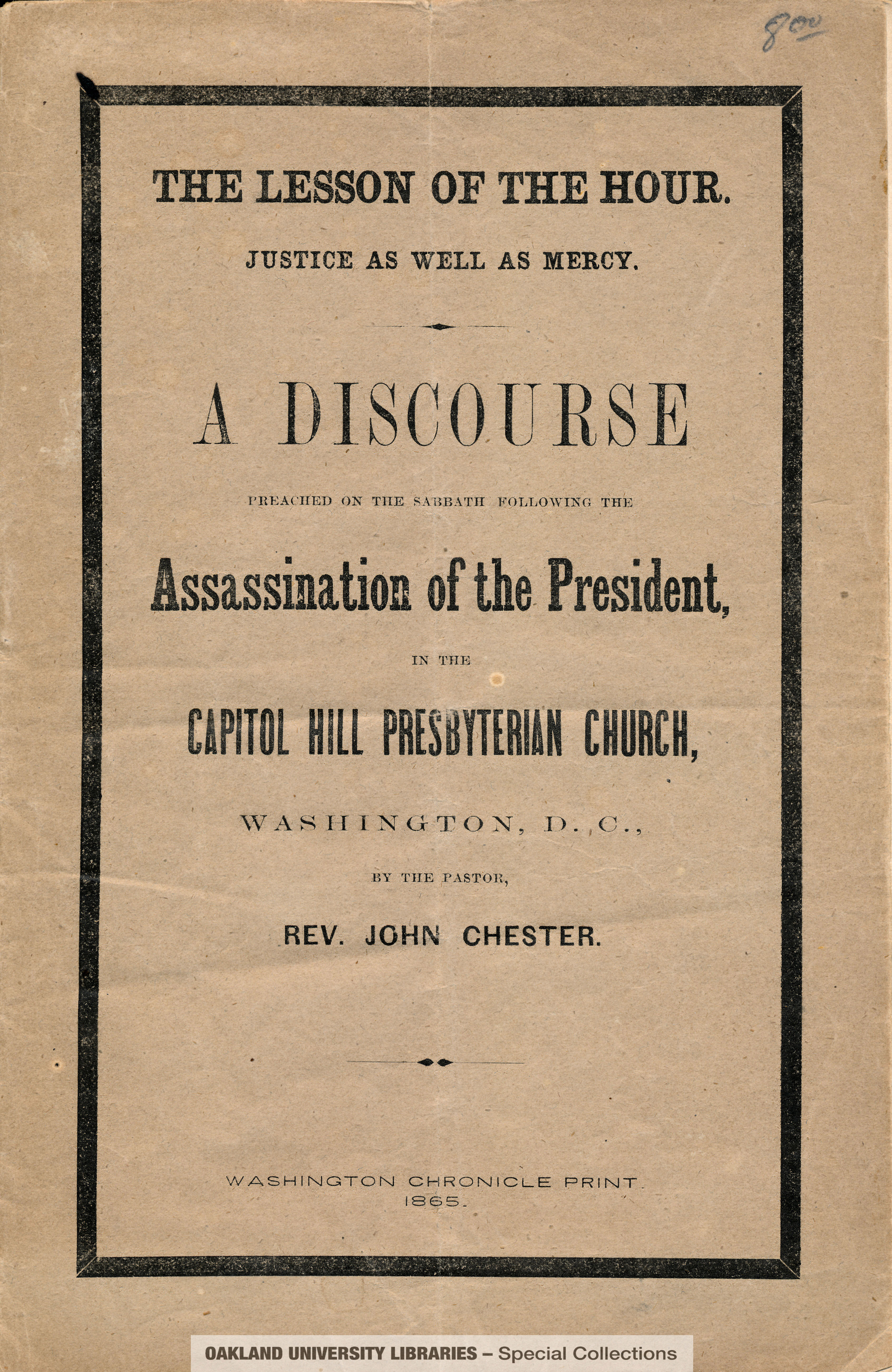
-
Description
A discourse preached on the sabbath following the assassination of the President, in the Capitol Hill Presbyterian Church, Washington, D.C., by the Pastor, Rev. John Chester. 300 copies of this eulogy were distributed. The author intended it as an appeal to the consciences of all supporters of the Union.
-
Source
Springer Collection, Oakland University Special Collections
-
Rights
This item may be reproduced and used for any purpose, including research, teaching, private study, publication, broadcast, or commercial use, with proper citation and attribution.
-
Creator
John Chester
-
Publisher
Washington Chronicle Print
-
Date
April 17, 1865
-
Material
paper
-
Dimensions
8 3/4"h x 5 5/8"w
from Apr. 16, 1865
The Martyr President
-
Full Title
The Martyr President: Our Grief and Our Duty
-
Description
Memorial oratory delivered by J.G. Butler, Pastor of St. Paul's Church on Easter Sunday Apr. 16, 1865.
-
Source
Springer Collection, Oakland University Special Collections
-
Rights
This item may be reproduced and used for any purpose, including research, teaching, private study, publication, broadcast, or commercial use, with proper citation and attribution.
-
Tags
-
Cite this Item
J.G. Butler. "The Martyr President: Our Grief and Our Duty". McGill&Witherow. Remembering Lincoln. Web. Accessed May 11, 2025. https://rememberinglincoln.fords.org/node/814
from Apr. 16, 1865
The Martyr President: Our Grief and Our Duty
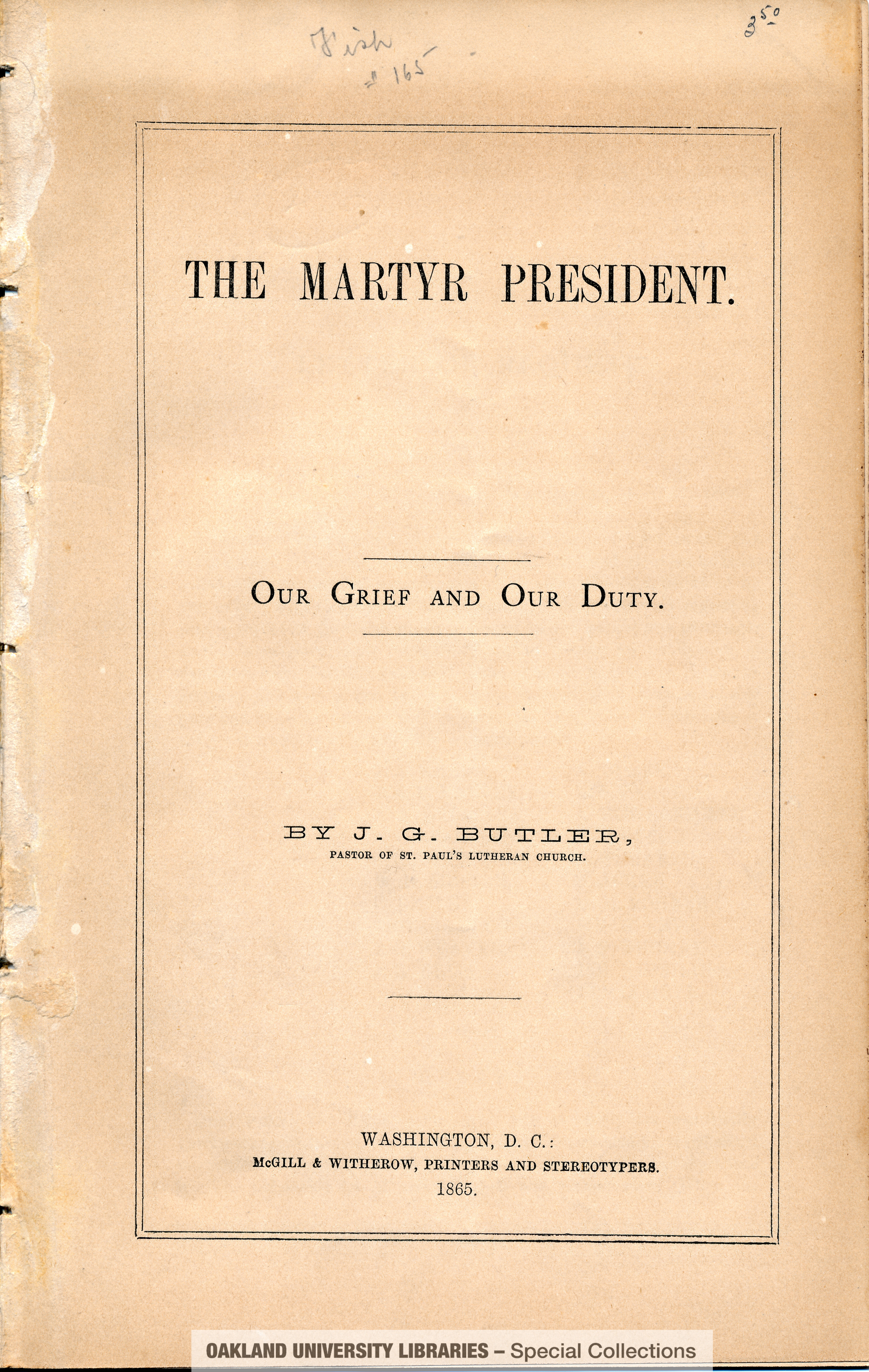
-
Description
Memorial oratory delivered by J.G. Butler, Pastor of St. Paul's Church on Easter Sunday Apr. 16, 1865.
-
Source
Springer Collection, Oakland University Special Collections
-
Rights
This item may be reproduced and used for any purpose, including research, teaching, private study, publication, broadcast, or commercial use, with proper citation and attribution.
-
Creator
J.G. Butler
-
Publisher
McGill&Witherow
-
Date
April 16, 1865
-
Material
paper
-
Dimensions
8 1/2"h x 5 1/2"w
from Feb. 12, 1866
In Memoriam of Abraham Lincoln
-
Full Title
In Memoriam of Abraham Lincoln, the Martyr President of the United States
-
Description
Eulogy delivered by the famous historian and statesman George Bancroft at the request of Congress in front of the House of Representatives on February 12, 1866. Originally published by the Government Printing Office, it was reprinted numerous times.
-
Source
Springer Collection, Oakland University Special Collections
-
Rights
This item may be reproduced and used for any purpose, including research, teaching, private study, publication, broadcast, or commercial use, with proper citation and attribution.
-
Tags
-
Cite this Item
George Bancroft. "In Memoriam of Abraham Lincoln, the Martyr President of the United States". L. Towers. Remembering Lincoln. Web. Accessed May 11, 2025. https://rememberinglincoln.fords.org/node/813
from Feb. 12, 1866
In Memoriam of Abraham Lincoln, the Martyr President of the United States
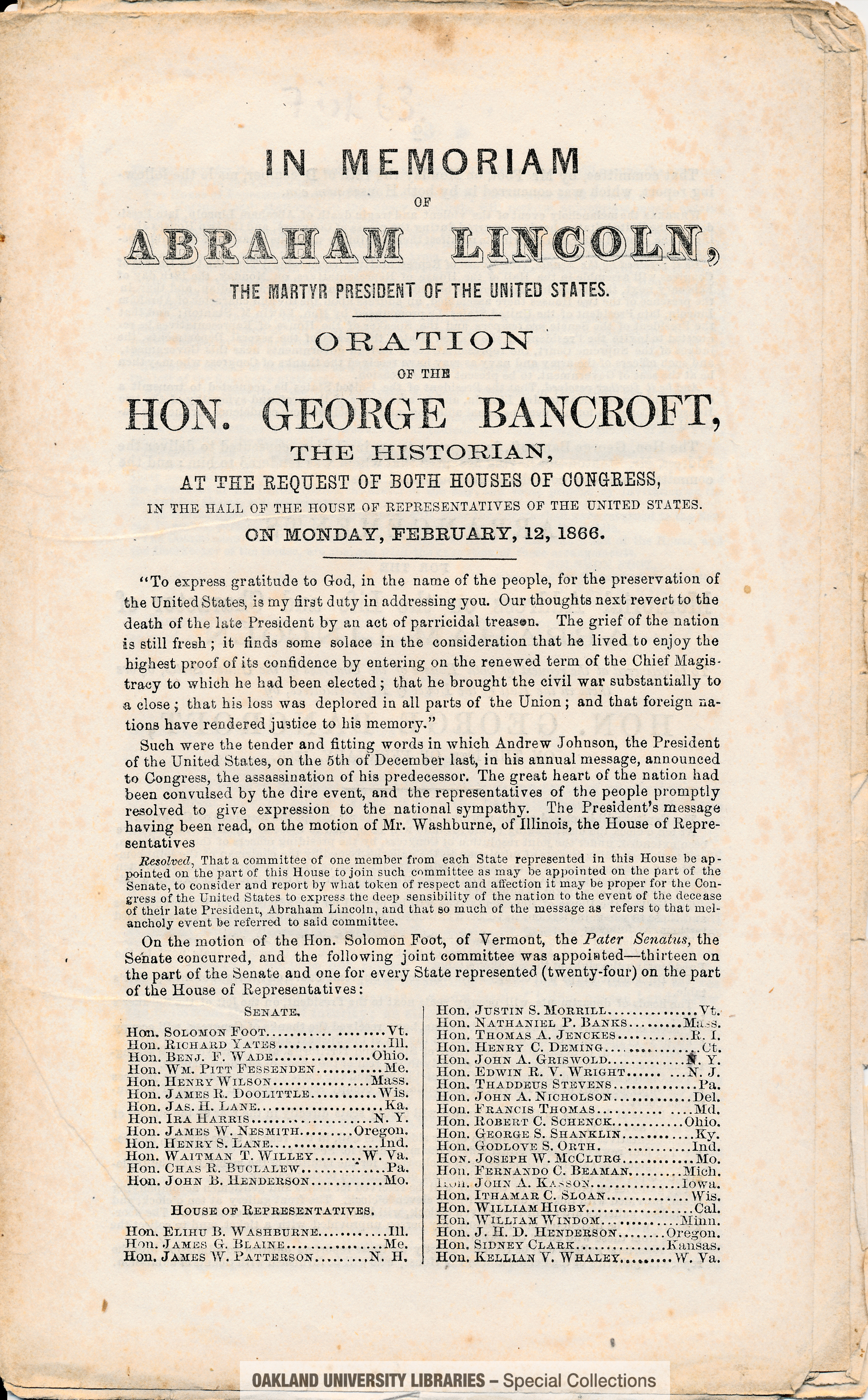
-
Description
Eulogy delivered by the famous historian and statesman George Bancroft at the request of Congress in front of the House of Representatives on February 12, 1866. Originally published by the Government Printing Office, it was reprinted numerous times.
-
Source
Springer Collection, Oakland University Special Collections
-
Rights
This item may be reproduced and used for any purpose, including research, teaching, private study, publication, broadcast, or commercial use, with proper citation and attribution.
-
Creator
George Bancroft
-
Publisher
L. Towers
-
Date
February 12, 1866
-
Material
paper
-
Dimensions
9 1/2"h x 6"w
from May. 2, 1865
Abraham Lincoln: Rede bei der Gedachtnissfeier
-
Full Title
Abraham Lincoln: Rede bei der Gedachtnissfeier in der Dorotheenkirche zu Berlin
-
Description
Cover of a 48-page German translation of "A discourse on the death of Abraham Lincoln delivered Tuesday, May 2, 1865, in the Dorotheen-Church, Berlin" by Henry P. Tappan.
-
Source
Springer Collection, Oakland University Special Collections
-
Rights
This item may be reproduced and used for any purpose, including research, teaching, private study, publication, broadcast, or commercial use, with proper citation and attribution.
-
Tags
-
Cite this Item
Henry P. Tappan. "Abraham Lincoln: Rede bei der Gedachtnissfeier in der Dorotheenkirche zu Berlin". H. Keller, Frankford am Main. Remembering Lincoln. Web. Accessed May 11, 2025. https://rememberinglincoln.fords.org/node/810
from May. 2, 1865
Abraham Lincoln: Rede bei der Gedachtnissfeier in der Dorotheenkirche zu Berlin
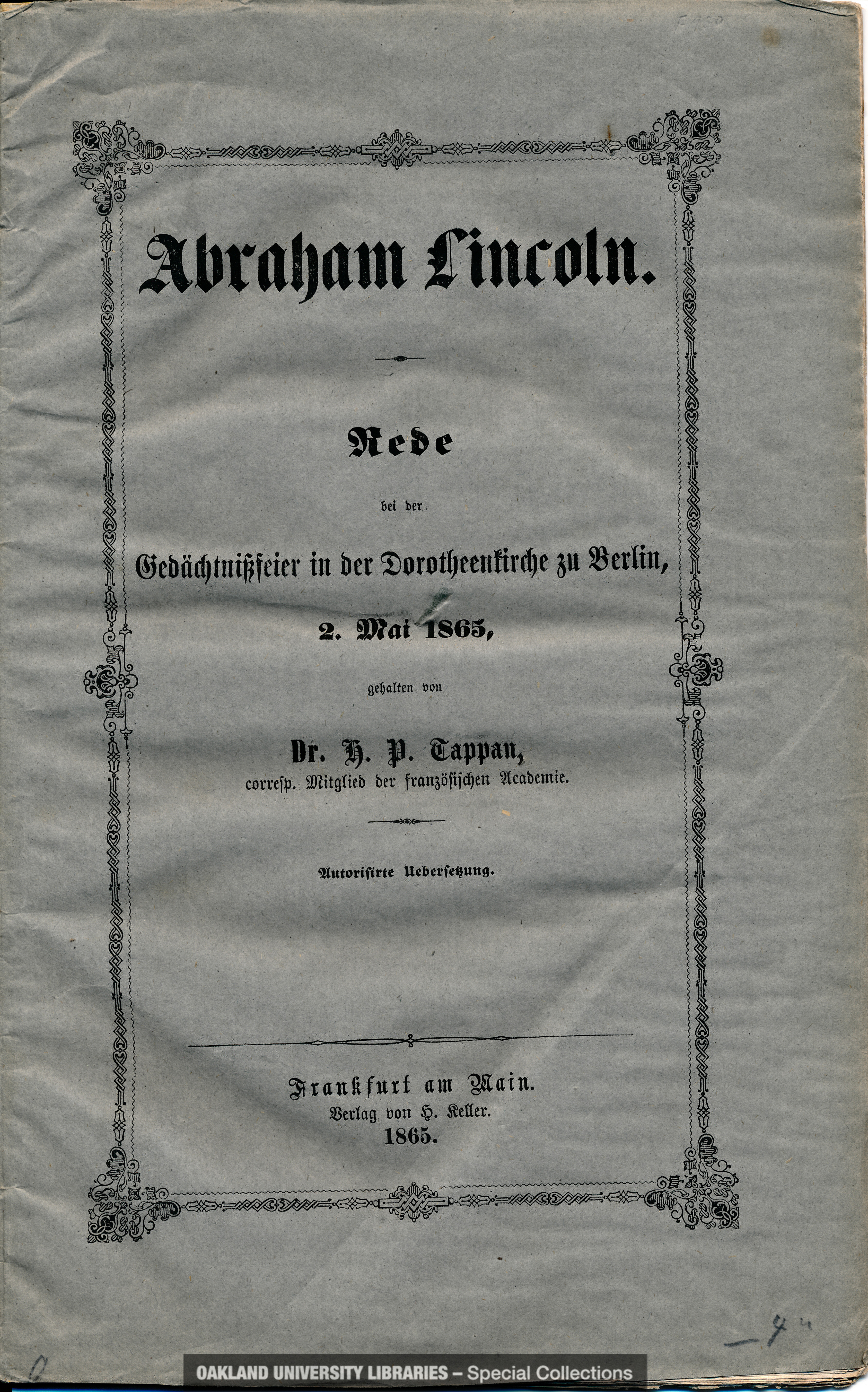
-
Description
Cover of a 48-page German translation of "A discourse on the death of Abraham Lincoln delivered Tuesday, May 2, 1865, in the Dorotheen-Church, Berlin" by Henry P. Tappan.
-
Source
Springer Collection, Oakland University Special Collections
-
Rights
This item may be reproduced and used for any purpose, including research, teaching, private study, publication, broadcast, or commercial use, with proper citation and attribution.
-
Creator
Henry P. Tappan
-
Publisher
H. Keller, Frankford am Main
-
Date
May 2, 1865
-
Material
paper
-
Dimensions
9"h x 5 3/4"w
from Apr. 17, 1865
Proceedings of a Called Meeting
-
Full Title
Proceedings of a called meeting of ministers of all religious denominations in the District of Columbia, in the First Baptist Church on Thirteenth Street, Monday, April 17
-
Description
Minutes of a meeting of ministers of various denominations in Washington, D.C. to organize a response to the assassination and burial of President Lincoln. Includes remarks by Rev. Gurley, who was a close friend of the Lincolns during his time as Chaplain of the United States Senate. He preached the funeral sermon at the White House on April 19.
-
Source
Springer Collection, Oakland University Special Collections
-
Rights
This item may be reproduced and used for any purpose, including research, teaching, private study, publication, broadcast, or commercial use, with proper citation and attribution.
-
Tags
-
Cite this Item
Phineas Densmore Gurley. "Proceedings of a called meeting of ministers of all religious denominations in the District of Columbia, in the First Baptist Church on Thirteenth Street, Monday, April 17". McGill & Witherow. Remembering Lincoln. Web. Accessed May 11, 2025. https://rememberinglincoln.fords.org/node/805
from Apr. 17, 1865
Proceedings of a called meeting of ministers of all religious denominations in the District of Columbia, in the First Baptist Church on Thirteenth Street, Monday, April 17
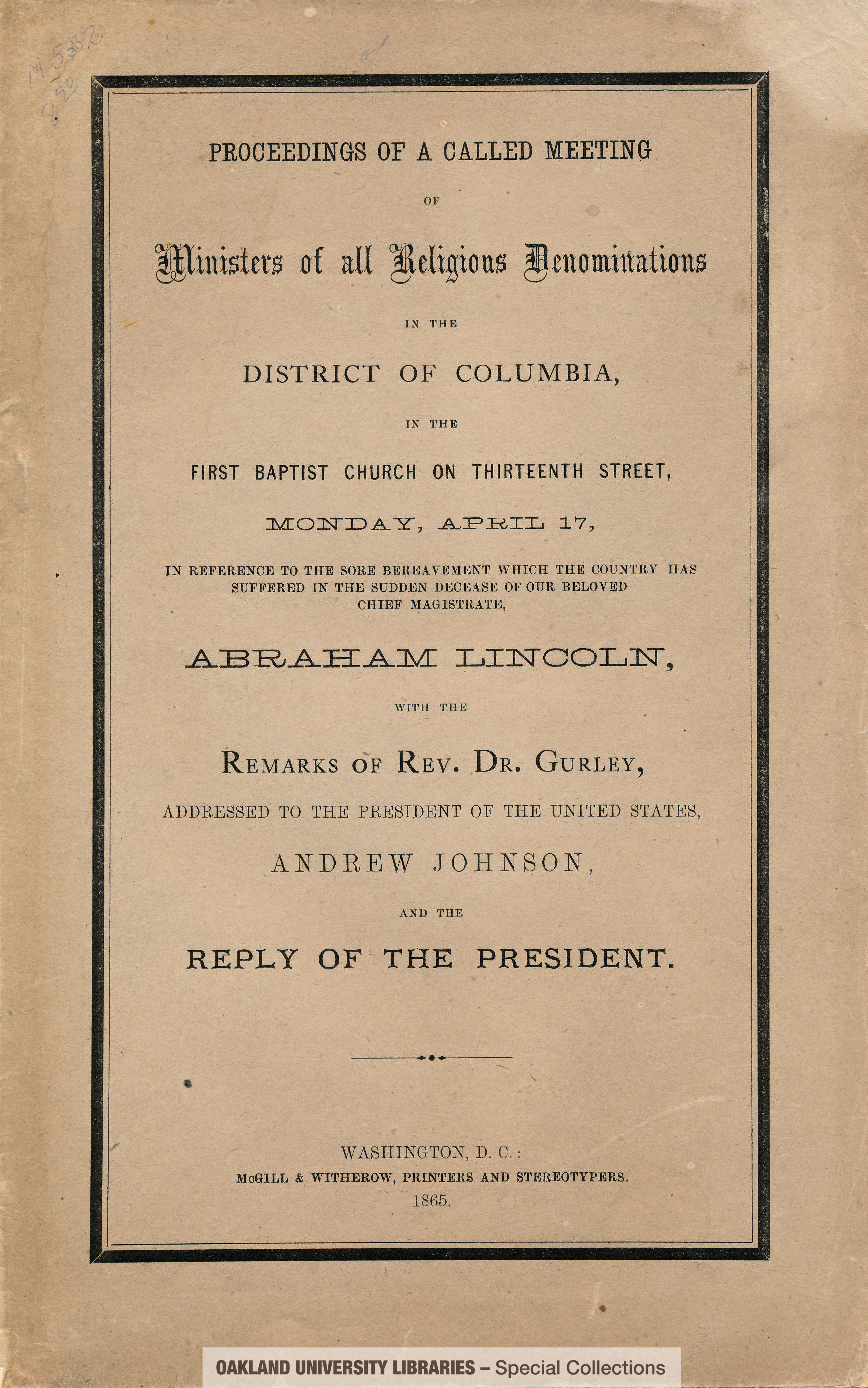
-
Description
Minutes of a meeting of ministers of various denominations in Washington, D.C. to organize a response to the assassination and burial of President Lincoln. Includes remarks by Rev. Gurley, who was a close friend of the Lincolns during his time as Chaplain of the United States Senate. He preached the funeral sermon at the White House on April 19.
-
Source
Springer Collection, Oakland University Special Collections
-
Rights
This item may be reproduced and used for any purpose, including research, teaching, private study, publication, broadcast, or commercial use, with proper citation and attribution.
-
Creator
Phineas Densmore Gurley
-
Publisher
McGill & Witherow
-
Date
April 17, 1865
-
Material
paper
-
Dimensions
9" h x 5 5/8" w
from Apr. 19, 1865
A Day of Mourning
-
Full Title
A Day of Mourning. The Nation Weeping for its Dead
-
Description
Reprint of the Springfield Republican report on several memorial events held at Springfield, Massachusetts. Contents: National mourning -- Proclamation -- President Lincoln's funeral day in Springfield -- Mayor's address -- Dr. Holland's Eulogy.
-
Source
Springer Collection, Oakland University Special Collections
-
Rights
This item may be reproduced and used for any purpose, including research, teaching, private study, publication, broadcast, or commercial use, with proper citation and attribution.
-
Tags
-
Cite this Item
Josiah Gilbert Holland. "A Day of Mourning. The Nation Weeping for its Dead". Samuel Bowles & Co.: L.J. Powers. Remembering Lincoln. Web. Accessed May 11, 2025. https://rememberinglincoln.fords.org/node/803
from Apr. 19, 1865
A Day of Mourning. The Nation Weeping for its Dead
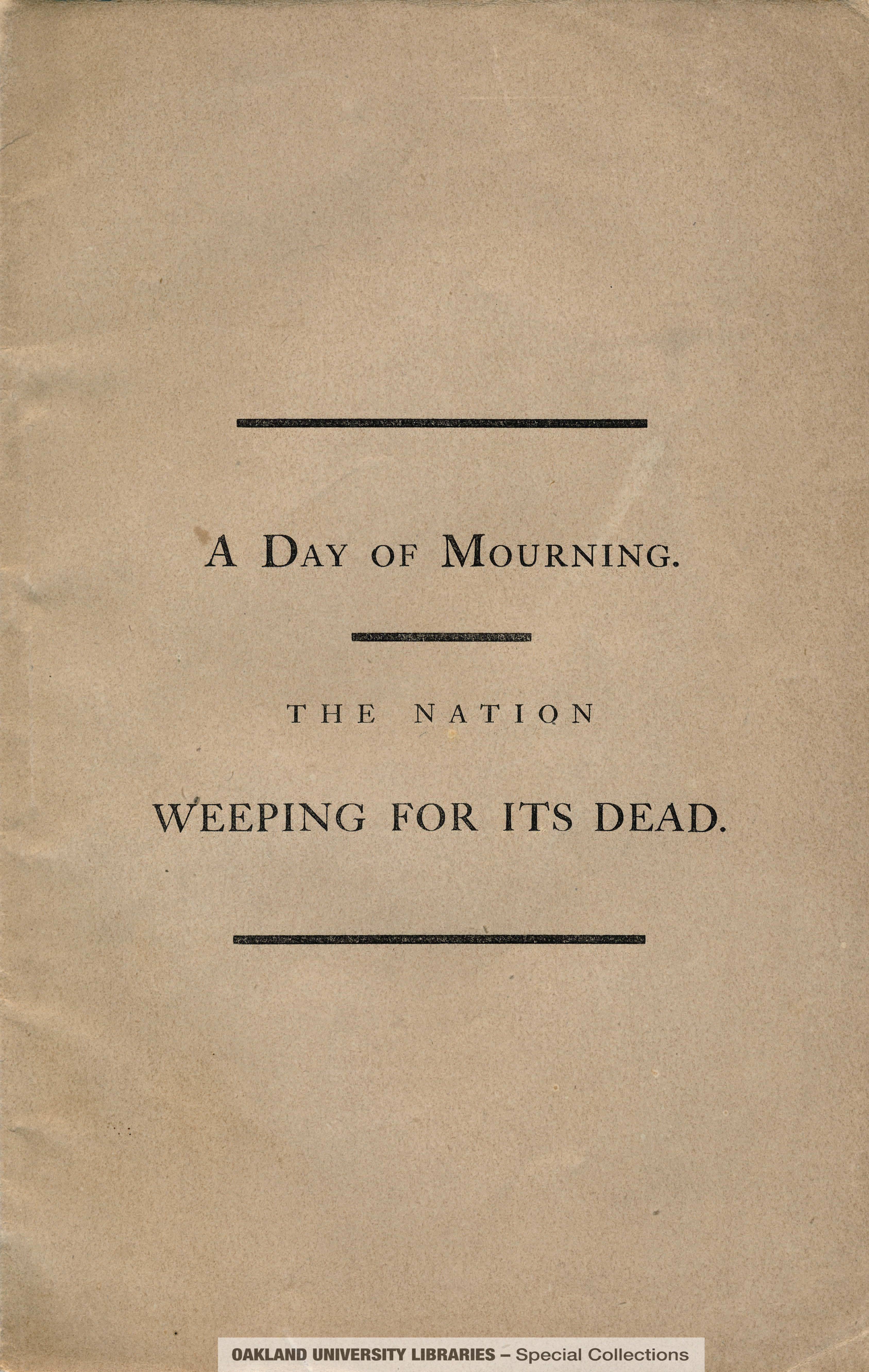
-
Description
Reprint of the Springfield Republican report on several memorial events held at Springfield, Massachusetts. Contents: National mourning -- Proclamation -- President Lincoln's funeral day in Springfield -- Mayor's address -- Dr. Holland's Eulogy.
-
Source
Springer Collection, Oakland University Special Collections
-
Rights
This item may be reproduced and used for any purpose, including research, teaching, private study, publication, broadcast, or commercial use, with proper citation and attribution.
-
Creator
Josiah Gilbert Holland
-
Publisher
Samuel Bowles & Co.: L.J. Powers
-
Date
April 19, 1865
-
Material
paper
-
Dimensions
9"h x 5 3/4"w
from May. 14, 1865
Sermon on the Assassination of Abraham Lincoln
-
Full Title
Sermon on the Assassination of Abraham Lincoln
-
Description
Sermon delivered by the pastor of the celebrated Surrey Chapel in London, a passionate opponent of slavery and supporter of Lincoln.
-
Source
Springer Collection, Oakland University Special Collections
-
Rights
This item may be reproduced and used for any purpose, including research, teaching, private study, publication, broadcast, or commercial use, with proper citation and attribution.
-
Tags
-
Cite this Item
Newman Hall. "Sermon on the Assassination of Abraham Lincoln". Bartlett and Halliday. Remembering Lincoln. Web. Accessed May 11, 2025. https://rememberinglincoln.fords.org/node/802
from May. 14, 1865
Sermon on the Assassination of Abraham Lincoln
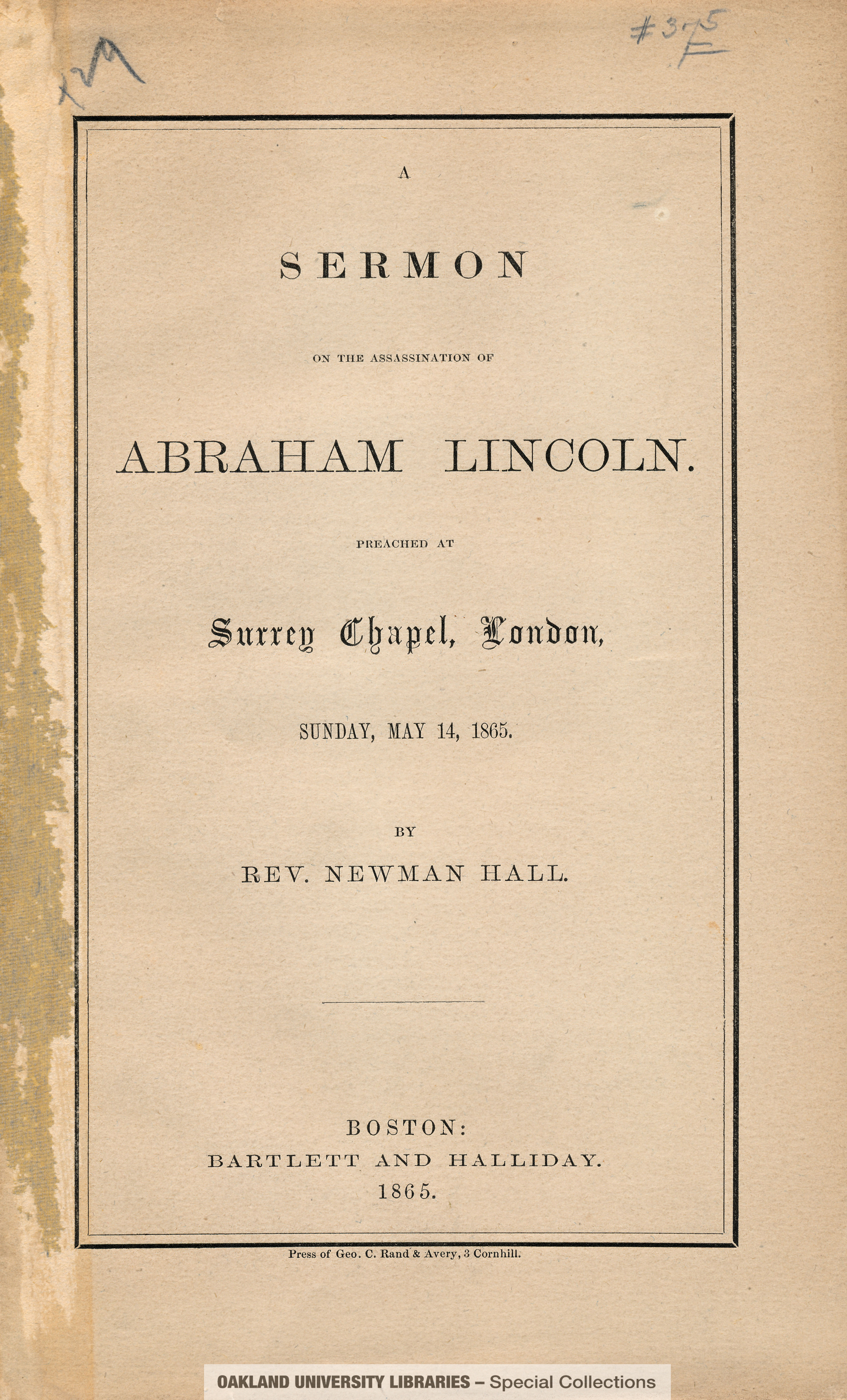
-
Description
Sermon delivered by the pastor of the celebrated Surrey Chapel in London, a passionate opponent of slavery and supporter of Lincoln.
-
Source
Springer Collection, Oakland University Special Collections
-
Rights
This item may be reproduced and used for any purpose, including research, teaching, private study, publication, broadcast, or commercial use, with proper citation and attribution.
-
Creator
Newman Hall
-
Publisher
Bartlett and Halliday
-
Date
May 14, 1865
-
Material
paper
-
Dimensions
9 1/2h x 5 13/16"w
from Apr. 19, 1865
Faith in God
-
Full Title
Faith in God
-
Description
Manuscript sermon delivered in the East Room of the Executive Mansion, Wednesday, April 19, 1865, at the funeral of Abraham Lincoln, President of the U.S., by the Reverend Phineas Densmore Gurley, pastor of the New York Avenue Presbyterian Church, Washington, D.C.
-
Transcription
[Page 1]
Faith in God:
A Sermon
Delivered in the East Room of the Executive Mansion.
Wednesday, April 19th, 1863.
At
The Funeral of Abraham Lincoln, President of the U. States
By The Rev. P. D. Gurley. D. D..
Pastor of the New York Avenue Presbyterian Church, Washington,
D.C.
[Page 2] 1
Funeral Address.
Mark x1. 22.
“Have Faith in God.”
As we stand here to-day, mourners around this coffin and around the lifeless remains of our beloved Chief Magistrate, we recognize and we adore the sovereignty of God. His throne is in the heavens, and his kingdom ruleth over all. He hath done, and He hath permitted to be done, whatsoever He pleased. “Clouds and darkness are round about Him; righteousness and judgment are the habitations of his throne.” His way is in the sea, and his path in the great waters, and his footsteps are not known. “Canst thou by searching find out God? Canst thou find out the Almighty unto perfection? It is as high as heaven; what canst thou do? Deeper than hell; what canst thou know? The measure thereof if longer than the earth, and broader than the sea. If he cut off, and shut up, or gather together, then who can hinder Him? For He knoweth vain men; He seeth wickedness also; will
[Page 3]
2
He not then consider it? — We bow before before his infinite majesty. We bow, we weep, we worship.
“Where reasons fails, with all her powers,
There faith prevails, and love adores.”
It was a cruel, cruel hand, that dark hand of the assassin, which smote our honored, wise, and noble President, and filled the land with sorrow. But above and beyond that hand there is another which we must see and acknowledge. It is the chastening hand of a wise and faithful Father. He gives us this bitter cup. And the cup that our Father hath give us, shall we not drink it?
“God of the just, thou gavest us the cup:
We yield to thy behest, and drink it up.”
“Whom the Lord loveth he chasteneth.” O how these blessed words have cheered and strengthened and sustained us through all these long and weary years of civil strife, while our friends and brothers on so many ensanguined fields were falling and dying for the causes of Liberty
[Page 4]
3
and Union! Let them cheer, and strengthen, and sustain us to-day True, this new sorrow and chastening has come in such an hour and in such a way as we thought not, and it bears the impress of a rod that is very heavy, and of a mystery that is very deep. That such a life should be sacrificed, at such a time, by such a foul and diabolical agency; that the man at the head of the nation, whom the people had learned to trust with a confiding and a loving confidence, and upon whom more than upon any other were centred, under God, our best hopes for the true and speedy pacification of the country, the restoration of the Union, and the return of harmony and love; that he should be taken from us, and taken just as the prospect of peace was brightly opening upon our torn and bleeding country, and just as he was beginning to be animated and gladdened with the hope of ere long enjoying with the people the blessed fruit and reward of his and their toil, and care, and patience, and self-sacrificing devotion to the interests of Liberty and the Union—O it is a mysterious and
[Page 5]
4
a most afflicting visitation! But it is our Father in heaven, the God of our fathers, and our God, who permits us to be so suddenly and sorely smitten; and we know that his judgments are right, and that in faithfulness He has afflicted us. In the midst of our rejoicings we needed this stroke, this dealing, this discipline; and therefore He has sent it. Let us remember, our affliction has not come forth of the dust, and our trouble has not sprung out of the ground. Through and beyond all second causes let us look, and see the sovereign permissive agency of the great First Cause. It is his prerogative to bring light out of darkness and good out of evil. Surely the wrath of man shall praise Him, and the remainder of wrath He will restrain. In the light of a clearer day we may yet see that the wrath which planned and perpetrated the death of the President, was overruled by Him whose judgments are unsearchable, and his ways past finding out, for the highest welfare of all those interests which are so dear to the Christian patriot and philanthropist,
[Page 6]
5
and for which a loyal people have made such an unexampled sacrifice of treasure and of blood. Let us not be faithless, but believing.
“Blind unbelief is prone to err,
And scan his work in vain;
God is his own interpreter,
And He will make it plain.”
We will wait for his interpretation, and we will wait in faith, nothing doubting. He who has led us so well, and defended and prospered us so wonderfully, during the last four years of toil, and struggle, and sorrow, will not forsake us now. He may chasten, but He will not destroy. He may purify us more and more in the furnace of trial, but He will not consume us. No, no! He has chosen us as He did his people of old in the furnace of affliction, and He has said of us as He said of them, “This people have I formed for myself; they shall show forth my praise.” Let our principal anxiety now be that this new sorrow may be a sanctified sorrow; that it
[Page 7]
6
may lead us to deeper repentance, to a more humbling sense of our dependence upon God, and to the more unreserved consecration of ourselves and all that we have to the cause of truth and justice, of law and order, of liberty and good government, of pure and undefiled religion. Then, though weeping may endure for a night, joy will come in the morning. Blessed be God! despite of this great and sudden and temporary darkness, the morning has begun to dawn—the morning of a bright and glorious day, such as our country has never seen. That day will come and not tarry, and the death of an hundred Presidents and their Cabinets can never, never prevent it. While we are thus hopeful, however, let us also be humble. The occasion calls us to prayerful and tearful humiliation. It demands of us that we lie low, very low, before Him who has smitten us for our sins. O that all our rulers and all our people may bow in the dust to-day beneath the chastening hand of God! And may their voices go up to Him as one voice, and their hearts
[Page 8]
7
go up to Him as one heart, pleading with Him for mercy, for grace to sanctify our great and sore bereavement, and for wisdom to guide us in this our time of need. Such a united cry and pleading will not be in vain. It will enter into the ear and heart of Him who sits upon the throne, and He will say to us, as to His ancient Israel, “In a little wrath I hid my face from thee for a moment: but with everlasting kindness will I have mercy upon thee, saith the Lord, the Redeemer.”—
I have said that the people confided in the late lamented President with a full and a loving confidence. Probably no man since the days of Washington was ever so deeply and firmly embedded and enshrined in the very hearts of the people as Abraham Lincoln. Nor was it a mistaken confidence and love. He deserves is—deserved it well—deserved it all. He merited it by his character, by his acts, and by the whole tenor, and tone, and spirit of his life. He was simple and sincere, plain and honest, truthful and just, benevolent and kind. His perceptions were quick and clear, his
[Page 9]
8
Judgments were calm and accurate, and his purposes were good and pure beyond a question. Always and every where he aimed and endeavored to be right and to do right. His integrity was thorough, all-pervading, all-controlling, and incorruptible. It was the same in every place and relation, in the consideration and the control of matters great or small, the same firm and steady principle of power and beauty that shed a clear and crowning lustre upon all his other excellencies of mind and heart, and recommended him to his fellow citizens as the man, who, in a time of unexampled peril, when the very life of the nation was at stake, should be chosen to occupy, in the country and for the country, its highest post of power and responsibility. How wisely and well, how purely and faithfully, how firmly and steadily, how justly and successfully he did occupy that post and meet its grave demands in circumstances of surpassing trial and difficulty, is known to you all, known to the country and the world. He comprehended from the
[Page 10]
9
first the perils to which treason had exposed the freest and best Government in the world on the earth, the vast interests of liberty and humanity that were to be saved or lost forever in the urgent impending conflict; he rose to the dignity and momentousness of the occasion, saw his duty as the Chief Magistrate of a great and imperiled imperiled imperilled people and he determined to do his duty, and his whole duty, seeking the guidance and leaning upon the arm of Him of whom it is written, “Hee giveth power to the faint, and to them that have no might he increaseth strength.” Yes, he leaned upon His arm. He recognized and received the truth that the “kingdom is the Lord’s, and He is the governor among the nations.” He remembered that “God is in the history,” and he felt that nowhere had his hand and his mercy been so marvellously conspicuous as in the history of this nation. He hoped and he prayed that that same hand would continue to guide us, and that same mercy continue to abound to us in the time of our greatest need. I speak what I know, and testify what I have
[Page 11]
10
often heard him say, when I affirm that that guidance and mercy were the prop on which he humbly and habitually leaned; they were the best hope he had for himself and for his country. Hence, when he was leaving his home in Illinois, and coming to this city to take his seat in the executive chair of a distrubed and troubled nation, he said to the oldand tried friends who gathered tearfully around him and bade him farewell, “I leave you with this request: pray for me.” They did pray for him; and millions of others prayed for him; not did they pray in vain. Their prayer was heard, and the answer appears in all his subsequent history; it shines forth with a heavenly radiance in the whole course and tenor of his administration, from its commencement to its close. God raised him up for a great and glorious mission, furnished him for his work, and aided him in its accomplishment. Nor was it merely by strength of mind, and honesty of heart, and purity and pertinacity of purpose, that He furnished him; in addition to these
[Page 12]
11
things, He gave him a calm and abiding confidence in the overruling providence of God and in the ultimate triumph of truth and righteousness through the power and the blessing of God. This confidence strengthened him in all his hours of anxiety and toil, and inspired him with calm and cheering hope when others were inclining to despondency and gloom. Never shall I forget the emphasis and the deep emotion with which he said in this very room, to a company of clergymen and others, who called to pay him their respects in the darkest days of our civil conflict: “Gentlemen, my hope of success in this great and terrible struggle rests on that immutable foundation, the justice and goodness of God. And when events are very threatening, and prospects very dark, I still hope that in some way which man can not see all will be well in the end, because our course is just, and God is on our side.” Such was his sublime and holy faith, and it was an anchor to his soul, both sure and steadfast. It made him firm and strong. It em-
[Page 13]
12
boldened him in the pathway of duty, however rugged and perilous it might be. It made him valiant for the right; for the cause of God and humanity, and it held him in steady, patient, and unswerving adherence to a policy of administration which he thought, and which one all now think, both God and humanity required him to adopt. We admired and loved him on many accounts—for strong and various reasons: we admired his childlike simplicity, his freedom from guile and deceit, his staunch and sterling integrity, his kind and forgiving temper, his industry and patience, his persistent, self-sacrificing devotion to all the duties of his eminent position, from the least to the greatest, his readiness to hear and consider the cause of the poor and humble, the suffering and the oppressed; his charity toward those who questioned the correctness of his opinions and the wisdom of his policy his wonderful skill in reconciling differences among the friends of the Union, leading them away from abstractions, and inducing them to work together and harmoniously for the common
[Page 14]
13
weal; his true and enlarged philanthropy, that knew no distinction of color or race, but regarded all men as brethren, and endowed alike by their Creator “with certain inalienable rights, among which are life, liberty, and the pursuit of happiness”; his inflexible purpose that what freedom had gained in our terrible civil strife should never be lost, and that the end of the war should be the end of slavery, and, as a consequence of rebellion; his readiness to spend and be spent for the attainment of such a triumph—a triumph, the blessed fruits of which shall be as widespreading as the earth and as enduring as the sun:—All these things commanded and fixed our admiration, and the admiration of the world, and stamped upon his character and life the unmistakable impress of greatness. But more sublime than any or all of these, more holy and influential, more beautiful, and strong, and sustaining, was his abiding confidence in God and in the final triumph of truth and righteousness through Him and for his sake. This was his noblest virtue,
[Page 15]
14
his grandest principle, the secret alike of his strength, his patience, and his success. And this, it seems to me, after being near him steadily, and with him often, for more than four years, is the principle by which, more than by any other, “he, being dead, yet speaketh.” Yes; by his steady enduring confidence in God, and in the complete ultimate success of the cause of God, which is the cause of humanity, more than by any other way, does he now speak to us and to the nation he loved and served so well. By this he speaks to his successor in office, and charges him to “Love faith in God.” By this he speaks to the members of his cabinet, the men with whom he counseled so often and was associated so long, and he charges them to “have faith in God.” BY this he speaks to the officers and men of our noble army and navy, and, as they stand at their posts of duty and peril, he charges them to “have faith in God.” By this he speaks to all who occupy positions of influence and authority in these sad and troublous times, and he charges them all to “have faith in God.” By
[Page 16]
15
this he speaks to this great people as they sit in sackcloth to-day, and weep for him with a bitter wailing, and refuse to be comforted, and he charges them to “have faith in God.” And by this he will speak through the ages and to all rulers and peoples of in every land, and his message to them will be, “Cling to liberty and right; battle for them; bleed for them; die for them, if need be; and have confidence in God.” O that the voice of this testimony may sink down into our hearts to-day and every day, and into the heart of the nation, and exert its appropriate influence upon our feelings, our faith, our patience, and our devotion to the cause of freedom and humanity—a cause clearer to us now than ever before, because consecrated by the blood of its most conspicuous defender, its wisest and most fondly-trusted lives, and He can guide and strengthen his successor, as He guided and strengthened him. He is dead; but the memory of his virtue, of his wise and patriotic counsels and labors, of his calm and steady faith in
[Page 17]
16
God, lives, is precious, and will be a power for good in the country quite down to the end of time. He is dead; but the cause he so ardently loved, so ably, patiently, faithfully represented and defended—not for himself only, not for us only, but for all people in all their coming generations, till time shall be no more—that cause survives his fall, and will survive it. The light of its brightening prospects flashes cheeringly to-day athwart the gloom occasioned by his death, and the language of God’s united providences is telling us that, though the friends of liberty die, liberty itself is immortal. There is no assassin strong enough and no weapon deadly enough to quench its inextinguishable life, or arrest its onward march to the conquest and empire of the world. This is our confidence, and this is our consolation, as we weep and mourn to-day. Though our beloved President is dead slain, our beloved country is saved. And so we sing of mercy as well as of judgment. Tears of gratitude mingle with those of sorrow. While there is darkness, there is also the dawning of a brighter, happier day
[Page 18]
17
Upon our stricken and weary land. God be praised that our fallen Chief lived long enough to see the day dawn and the daystar of joy and peace arise upon the nation. He saw it, and he was glad. Alas! Alas! He only saw the dawn. When the sun has risen, full—orbed and glorious, and a happy reunited people are rejoicing in its light,—alas! Alas! It will shine upon his grave. But that grave will be a precious and a consecrated spot. The friends of liberty and of the Union will repair to it in years and ages to come, to pronounce the memory of its occupant blessed, and, gathering from his very ashes, and from the rehearsal of his deeds and virtues, fresh incentives to patriotism, they will there renew their vows of fidelity to their country and their God.
And now I know not that I can more appropriately conclude this discourse, which is but a sincere and simple utterance of the heart, than by addressing to our departed President, with some slight modification, the language which Tacitus in his life of Agricola, addressed to his venerable and de
[Page 19]
18
parted father-in-law: “With you we may not congratulate; you are blessed, not only because your life was a career of glory, but because you were released, when, your country safe, it was happiness to die. We have lost a parent, and, in our distress, it is now an addition to our heartfelt sorrow that we had it not in our power to commune with you on the bed of languishing, and receive your last embrace. Your dying words would have been ever dear to us; your commands we should have treasured up; and graved them on our hearts. This sad comfort we have lost, and the wound for that reason, pierces deeper. From the world of spirits behold your disconsolate family and people; exalt our minds from fond regret and avoiding grief to the contemplation of your virtues. Those we must not lament; it were impiety to sully them with a tear. To cherish their memory, to embalm them with our praises, and, so far as we can, to emulate your bright example, will be the truest mark of our respect, the best tribute we can offer. Your wife will thus preserve the memory of the best of husbands, and thus your children
[Page 20]
19
will prove their filial piety. By dwelling constantly on your words and actions, they will have an illustrious character before their eyes, and, not content with the bare image or your mortal frame, they will have what is more valuable—the form and features of your mind. Busts and statues, like their original, are frail and perishable. The soul is formed of fine elements, and its inward form is not to be expressed by the hand of an artist with unconscious matter—our manners and our morals may in some degree trace the resemblance. All of you that gained out love and raised our admiration still subsists, and will ever subsist, preserved in the minds of men, the register of ages, and the records of fame. Others, who have figured on the stage of life and were the worthies of a former day, will wink, for want of a faithful historian, into the common lot of oblivion, inglorious and unremembered; but you, our lamented friend and head, delineated with truth, and fairly consigned to prosperity, will survive yourself, and triumph over the injuries of time.”—
[Transcription by McCaela Michas]
-
Source
RAREDOC G963f, Presbyterian Historical Society, Philadelphia, PA
-
Rights
Use of this item for research, teaching, and private study is permitted with proper citation and attribution. Reproduction of the images of this item for publication, broadcast, or commercial use requires written permission from the Presbyterian Historical Society. For permission, contact the Reference Desk.
-
Tags
-
Cite this Item
Gurley, P.D. (Phineas Densmore), 1816-1868.. "Faith in God". Remembering Lincoln. Web. Accessed May 11, 2025. https://rememberinglincoln.fords.org/node/763
from Apr. 19, 1865
Faith in God
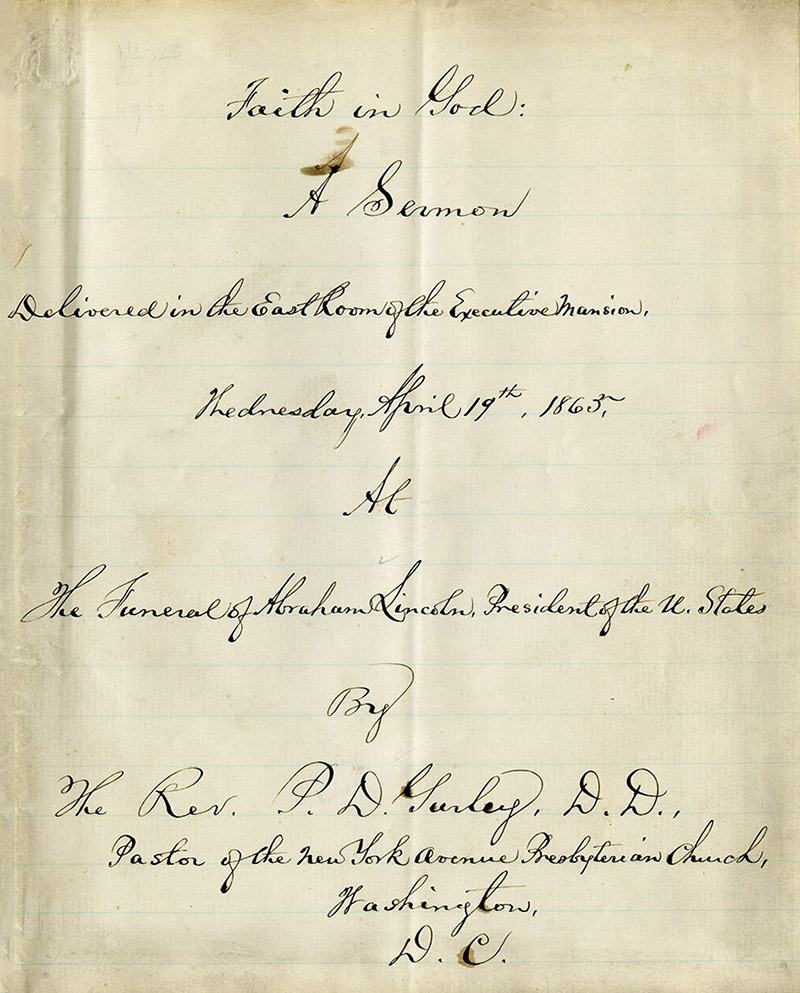
-
Description
Manuscript sermon delivered in the East Room of the Executive Mansion, Wednesday, April 19, 1865, at the funeral of Abraham Lincoln, President of the U.S., by the Reverend Phineas Densmore Gurley, pastor of the New York Avenue Presbyterian Church, Washington, D.C.
-
Source
RAREDOC G963f, Presbyterian Historical Society, Philadelphia, PA
-
Rights
Use of this item for research, teaching, and private study is permitted with proper citation and attribution. Reproduction of the images of this item for publication, broadcast, or commercial use requires written permission from the Presbyterian Historical Society. For permission, contact the Reference Desk.
-
Creator
Gurley, P.D. (Phineas Densmore), 1816-1868.
-
Date
April 19, 1865
-
Material
paper and ink
-
Dimensions
9.75" x 7.75"

